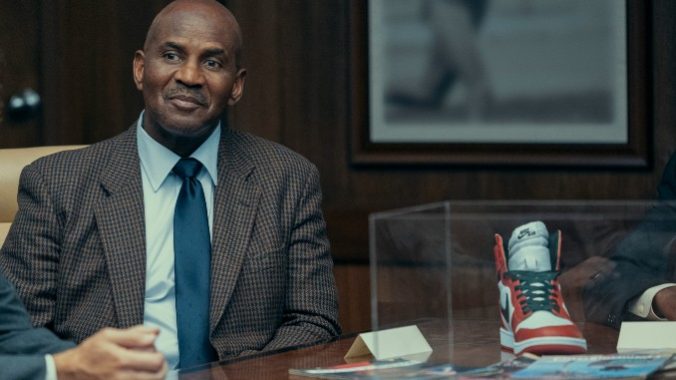Nostalgia and Corporate Identity in Air

Two concurrent, often overlapping, trends in popular media and capitalism come to bear on audiences in Air: Nostalgia and increasingly bald advertising. Neither are completely new, but they feel increasingly blatant, what with a Mario movie opening concurrently and Tetris soon coming to Apple TV+.
In 2014, critics and audiences were united in dismissing FIFA propaganda vehicle United Passions—a film about the founding of the international soccer governing body which John Oliver ridiculed on his show for being a sports biopic focused on executives. In 2023, a film about Nike signing a contract to use Michael Jordan’s likeness to sell shoes is a critical success. A lot has changed in the intervening decade, but Nike (with help from Amazon, writer Alex Convery and director Ben Affleck) figured out a formula to successfully channel positive connotations with one of the greatest athletes of all time into a feel-good movie that relies on viewers identifying with and rooting for a billion-dollar corporation. It’s a combination workplace comedy/business thriller that relies on the dramatic irony of suspended knowledge (everyone knows how the story will end, they’re watching to see how it gets there) rather than suspended disbelief for audience buy-in and manages to place viewers on the side of corporate victory, all augmented by the success of a billionaire ex-athlete.
One of the funniest things about Air is the way it establishes setting with documentary footage and music. Air is insistent that it’s set in the early 1980s. This specificity is a good thing, and one of the film’s great strengths is that it also establishes this diegetically through clothing, makeup, hair and color (rather than an over-reliance on vaporwave neon, there’s a lot of wood paneling, a lot of orange-brown plastic); the score also makes delightful use of synthesizers. But the audience’s introduction to this space and time is through clips of ‘80s pop culture: Documentary footage, pieces of commercials and segments from news shows—all before the story starts.
The Reagans help set the tone, but the greater focus is on lots of other non-Nike products, many of which still exist and have simply had logo changes. So, from the start, the mindset of the film is being established through the material culture of brands like Wonder Bread; it is product placement as nostalgia. Rather than being a critical commentary on the way 1980s consumerism helped create our current era, it’s a wistful look back at those days, the imagined warmth of an idealized past, as if their vapidity was evidence of a purer or more innocent time. Air maintains this I Love the ‘80s tone throughout. Dire Straits’ “Money for Nothing” plays in this opening sequence but is replaced when the trick is strangely pulled again. A similar montage occurs during a travel sequence, just in case the viewers forgot when Michael Jordan was drafted and signed the contract.
“Money for Nothing” isn’t the only song to grace the film’s soundtrack. It’s almost as though they asked the Spotify algorithm for the most-played or recalled tracks of the early decade (including “Axel F” by Harold Faltermeyer from Beverly Hills Cop, “Let It Whip” by Dazz Band, “Legs” by ZZ Top,” “I Can Dream About You” by Dan Hartman from Streets of Fire, among others, with a few deeper cuts mixed in). The musical focus for the needledrops (if not the score) is much more on a nostalgic vibe than on matching the mood of anything happening in each scene.
Zapp’s “Computer Love” plays while the lead shoe designer (Matthew Maher as Peter Moore) is first introduced. There’s a knowingness to the song selection, allowing us to feel like we’re in the know without diving into any album’s deep cuts. The 1982 Alan Parsons Project song “Sirius” (better known to some of us as the 1990s Bulls warm-up music) plays when Jordan arrives at Nike for the pitch meeting, part of the dramatic prescience of the sequence.
The saturated sense of familiarity is a tool to make us feel more comfortable within the story. This, in turn, leads to another familiar tool of biopics and historical fiction: Words on the screen naming facts and figures that will change from their first introduction to the wrap-up after the plot has happened.
-

-

-

-

-

-

-

-

-

-

-

-

-

-

-

-

-

-

-

-

-

-

-

-

-

-

-

-

-

-

-

-

-

-

-

-

-

-

-

-








































